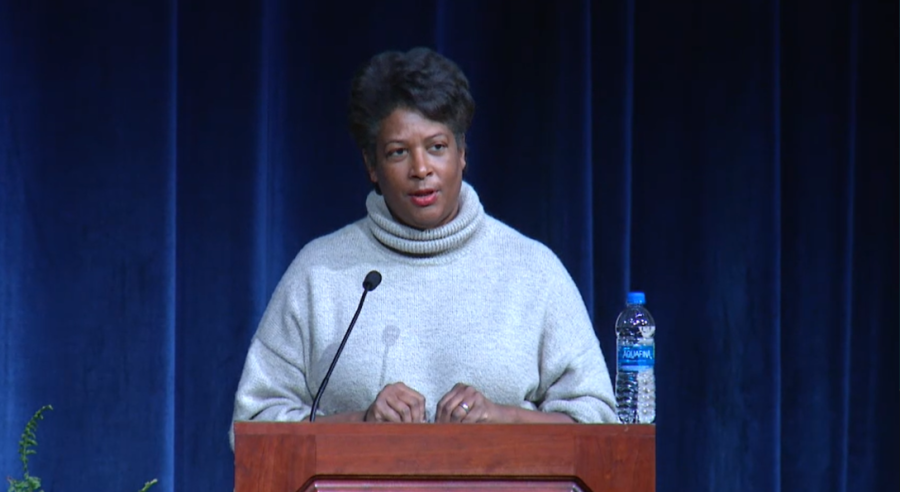Kent State Martin Luther King Jr. celebration features acclaimed filmmaker Dawn Porter
Dawn Porter, award-winning documentary filmmaker, addresses a virtual crowd as keynote speaker at Kent State University’s Martin Luther King Jr. Celebration, on Thursday, Jan. 27, 2022.
January 30, 2022
The song “Lift Every Voice and Sing,” rang through the nearly-empty ballroom of Kent State University’s Student Center Jan. 27. The song marked the beginning of the university’s celebration of Martin Luther King Jr.’s legacy–where keynote speaker, Dawn Porter, talked about three of her films and her experiences as a Black filmmaker documenting civil rights.
“Documentary isn’t just about history, it isn’t about things that happened in our past and understanding them,” Porter said. “It is also a view towards the present.”
The event was opened by N. J. Akbar, associate vice president for Division of Diversity, Equity and Inclusion.
“As we pay tribute to Dr. King and the ideals that he so gallantly advocated, we stand together in solidarity,” Akbar said. “Our program today is our way of honoring the life and legacy of Dr. King, by reminding each and every one of us of our duty of service, and our duty for justice.”
President Todd Diacon took to the podium and reflected on a friend he made while in college. Diacon said he was proud of his knowledge of history and knowing this, his friend, Lamar Burtz, asked him if he knew of the Tulsa Race Massacre. Diacon did not, and Burtz was disappointed, telling Diacon, “you’ve got to open your eyes.”
“Since then, I’ve read about the massacre, I toured the site, and I certainly look forward to the documentary film directed by our speaker today,” Diacon said. “Lamar opened my eyes and I began to learn.”
Undergraduate student government President Chazzlyn Jackson introduced Porter and her accomplishments as a director and producer.
“It is an honor for me to introduce our program’s keynote speaker, the award-winning documentary filmmaker Dawn Porter,” Jackson said.
Porter has directed and produced many films: “Gideon’s Army,” “Spies of Mississippi,” “Trapped,” “Bobby Kennedy for President,” “John Lewis: Good Trouble,” “The Way I See It” and “The Me You Can’t See.”
All are documentaries that look at activists’ lives and how they changed America. Porter spoke of her experiences working on the films ‘John Lewis: Good Trouble,’ ‘Bobby Kennedy for President’ and the short film ‘Bree Wayy: Promise Witness Remembrance.’ She spoke on how the people these films were based on, like Martin Luther King Jr., embody American activism by spurring change.
The event finished with a conversation between Porter and assistant dance professor Gregory King.
When King asked why Porter was the one to tell former Congressman John Lewis’ story of civil rights activism, Porter said “It was a film I needed to make. I needed to believe in our government, I needed to believe in leaders with integrity and empathy. I needed to remember the leaders and people who were really trying their best to do best for people, and never forgetting that there are people at the other end of all these policies.”
King acknowledged that when Martin Luther King Jr. Day approaches, he and many others see people quoting him and what he stood for and how he advocated for peace. “But they don’t take his entire speeches into context. People are forgetting that before obtaining that peace, there had to be justice,” King said. He asked Porter where we are in that fight for justice.
“You can only have justice if you understand the depth of the problem. I think we are still understanding and unpacking the problem… and I think people misunderstand nonviolence,” Porter said.
Porter quoted King Jr.’s philosophy towards nonviolent approaches during the celebration.
“Nonviolence was the answer. When he chooses to be nonviolent it is because he refuses to lose his humanity,” Porter said, quoting King Jr. “I will not let my enemy take away my humanity. When I choose to be violent in response to oppression, it is because I am honoring my humanity.”
Baylee Sweitzer is a reporter. Contact her at [email protected].












